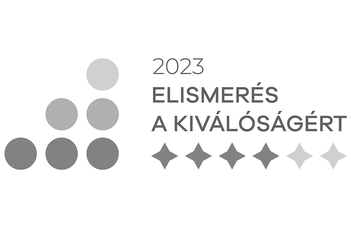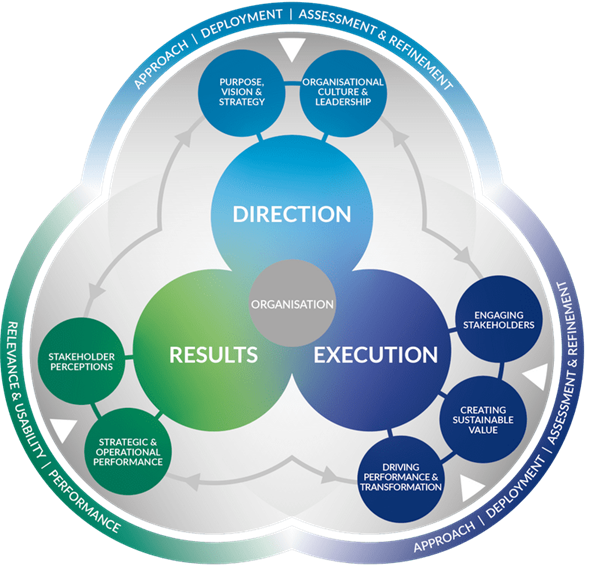ELTE GTK Awarded 4-Star Recognition by EFQM

ELTE GTK is the first faculty of a higher education institution in Hungary to be awarded this prestigious recognition in the EFQM system in the nearly 30-year history of Hungarian quality awards. This acknowledgement is important because the EFQM recognition shows how well an organisation is performing against a globally proven management framework – the EFQM Model.

Tihamér Margitay, ELTE GTK Dean and Kálmán Szabó, Managing Director of The Hungarian Association for Excellence at the Award Ceremony
About EFQM and the EFQM Model
The European Foundation for Quality Management (EFQM), which is an independent and non-profit organisation, was founded by 14 European corporations in 1988 primarily to support organisations in managing change and improving performance, thus increasing their competitiveness. This period coincided with the wider adoption of the Total Quality Management (TQM) philosophy. The EFQM Model was developed by the early 1990s and today, it is trusted, used, and consumed by over 50,000 organisations all over the world, including such distinguished and successful companies as BMW, Robert Bosch, Siemens, and Huawei. Soon after its inception, the EFQM Model was adopted as the evaluation framework of the European Quality Award (EQA). Based on the EQA, European countries established their own national awards, and in 1996 the Hungarian National Quality Award was launched in Hungary. The newest EFQM Model was introduced in 2019.
To understand the EFQM Model better, visit their website.

About ELTE GTK’s Progress to Recognition
The assessment of an organisation in the EFQM framework consists of two major steps.
The first step is a rigorous self-evaluation process during which three questions must be answered (see the above EFQM model):
- WHY: Why does this organisation exist? What purpose does it fulfil? Why this particular Strategy? (DIRECTION)
- HOW: How does the organisation intend to deliver on its Purpose and its Strategy? (EXECUTION)
- WHAT: What has the organisation actually achieved to date? What does it intend to achieve tomorrow? (RESULTS)
ELTE GTK conducted a thorough self-evaluation in Q2 of 2022 using the EFQM model's set of criteria to evaluate its processes, methods, and results from multiple perspectives and in considerable depth. During this process, the Faculty as an organisation carried out a situation analysis, identified and prioritised areas for improvement and incorporated these ideas into its strategy.
The second step consisted of a four-day on-site visit by EFQM assessors, during which the submitted self-evaluation document was reviewed and discussed in detail, and a series of interviews with management, staff and students were conducted. The assessors, who continuously supported ELTE GTK’s team, looked for organisational operational evidence to substantiate the claims made in the application: ELTE GTK had to verify that what had been described in the document was in fact the case. The whole process, albeit rigorous, was well-meaning and entirely supportive: the assessors, who acted as “critical friends”, helped identify gaps and rigid organisational mechanisms, which need to be addressed to raise the level of excellence and to derive directions for improvement and future action.
ELTE GTK is proud to announce that it scored highest on organisational culture and leadership, and sustainable value creation. The latter refers to the development and proper management of a service portfolio that meets student expectations. Areas for improvement include the adoption of a market-conscious approach. Higher education institutions must also be aware that they operate not in a "vacuum", but are part of a larger, complex ecosystem, in which other known and as yet unknown actors are present who can help or hinder the development of the organisation. Therefore, identifying a broader range of stakeholders, understanding their expectations and satisfaction, and incorporating this as input in setting future directions is a challenge for the institution.
The Faculty’s positive approach is proven by the fact that, based on the tailored feedback received from the evaluation team, some new projects have already been launched, such as formalising the Faculty’s corporate relations, developing student well-being processes, developing an internal employee satisfaction survey, and the definition of some of the current processes.
About ELTE GTK’s 4-Star Recognition

At the end of the evaluation process, ELTE Faculty of Economics was awarded over 400 points (on a 1,000-point scale) for its performance, which translates as a 4-star EFQM recognition. The true value of this recognition, which is valid for three years, is shown in the recognition system used by EFQM, below:

The recognition attests ELTE GTK’s impressive achievements in its fairly short history as a Faculty and demonstrates to the world and, particularly, its stakeholders that the Faculty of Economics is committed to continuous improvement. On a national level, the EFQM recognition stands for the Silver Recognition, which may be the first step on the journey to winning the Gold Recognition, i.e., the National Excellence Award. And to look even further, competitiveness on an international level (6-700 points) is not that far away, either.

ELTE’s management team during the award ceremony together with Kálmán Szabó (from the left): Zoltán Fortuna (Head of Office, Finance), Zsuzsanna Eszter Tóth (Vice-Dean for Academic Affairs), Tihamér Margitay (Dean), Gábor Zemplén (Vice-Dean for International Affairs), Kálmán Szabó (Managing Director of The Hungarian Association for Excellence) Judit Fortvingler (Director of Foreign Affairs)
Further information: EFQM English website and Szövetség a Kiválóságért website (in Hungarian)

